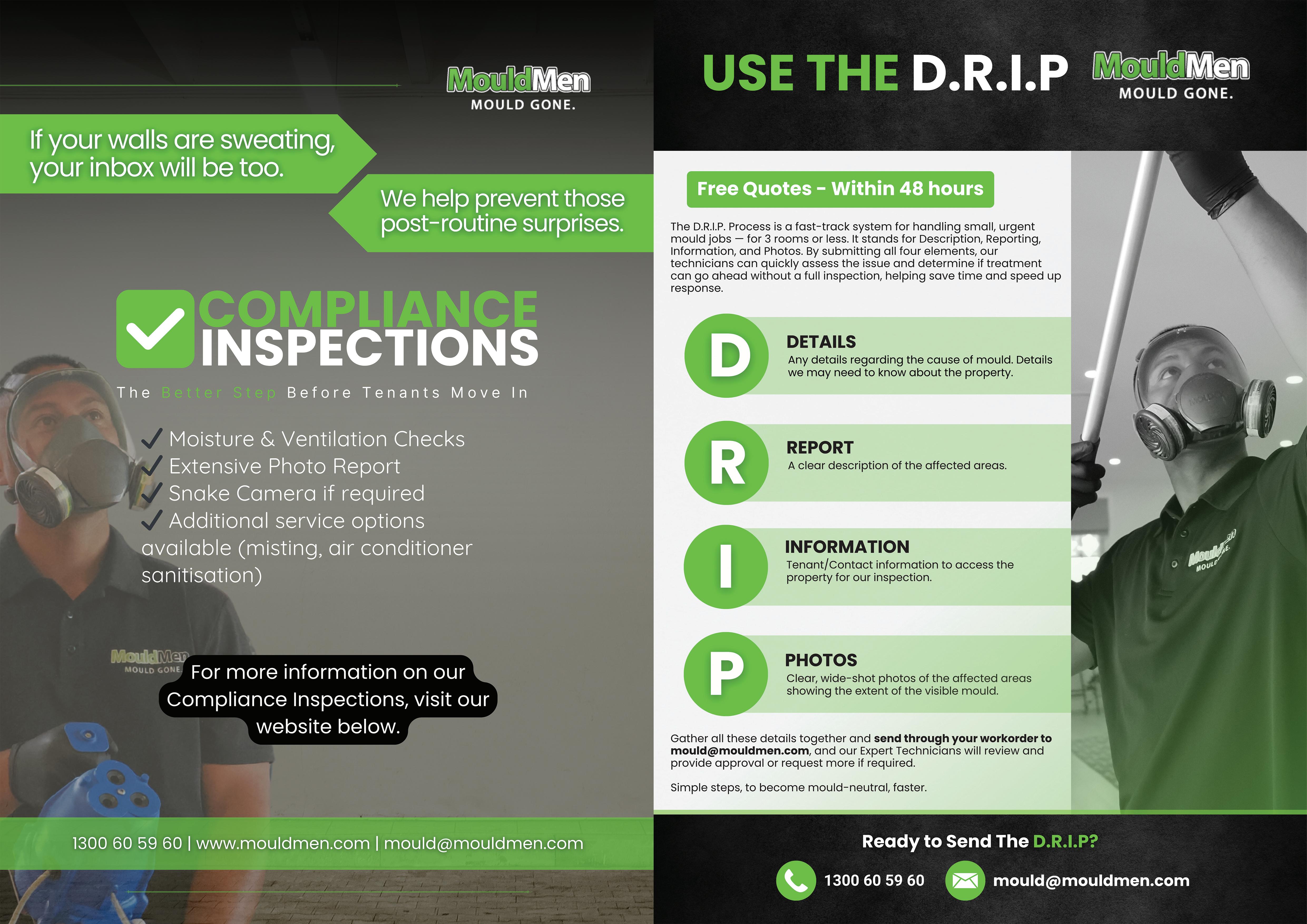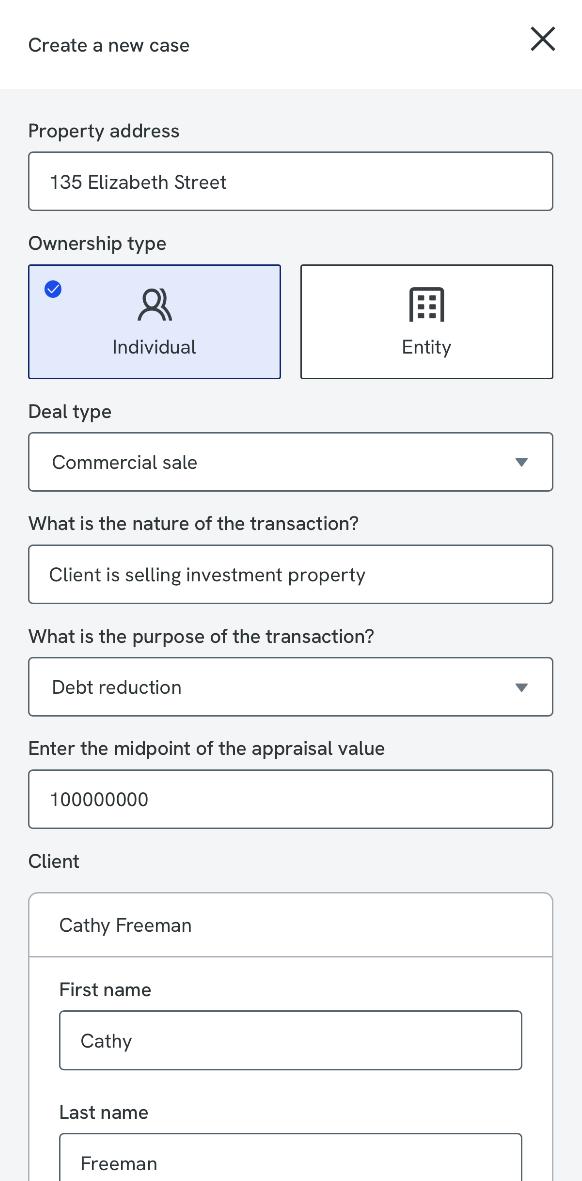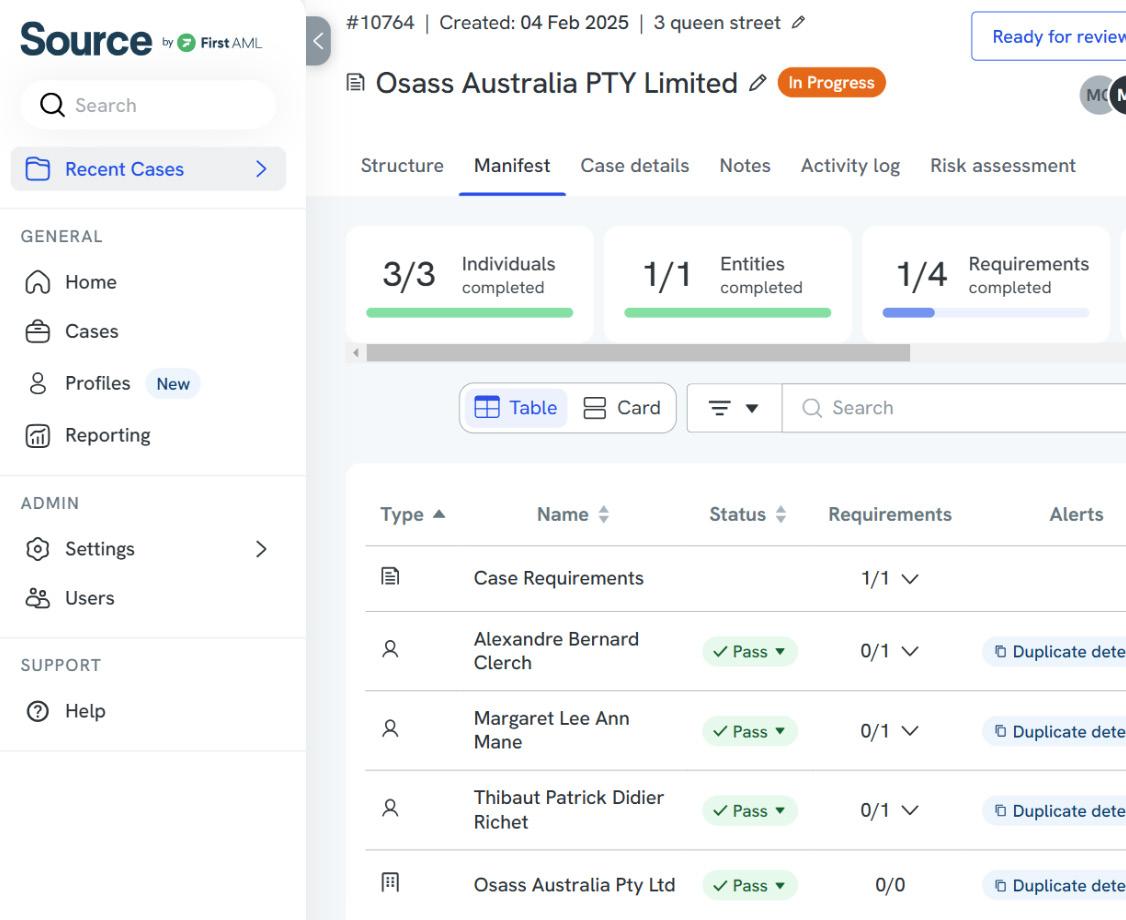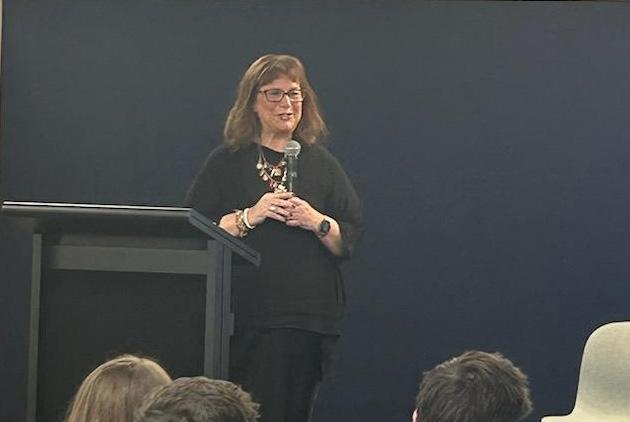

PARTNERS IN CRIME FIGHTING



PRESIDENT’S REPORT
IT IS WITH IMMENSE GRATITUDE AND HONOUR THAT I WRITE MY FIRST REPORT AS REIV PRESIDENT
To be elected by my peers to lead this vital institution is a privilege I deeply respect. I’m pleased to announce that Hayley Mitchell has been appointed vice president, and together with the board, we are energised by recent developments and excited for what lies ahead.
We recently farewelled our CEO, Kelly Ryan, who concluded her tenure with the REIV earlier this year. I want to sincerely thank Kelly for her dedication and the many contributions she made during her leadership. Her legacy is appreciated by our members and recognised across the industry. The Nominations and Remuneration Committee has commenced the recruitment process for our next CEO, with applications closing soon.
In the interim, we warmly welcome Jacob Caine as interim CEO. Jacob has stepped into the role with great energy and commitment, drawing on his working knowledge of the Institute, and is already making a strong impact across the organisation. We are grateful for his leadership during this transition and look forward to what he continues to achieve in the months ahead.
With much anticipation and excitement, we moved into our new headquarters in Abbotsford earlier this year and have been pleased to begin hosting events and training in the new space. Our official opening from August 1 formally launched the new REIV headquarters. The space has already hosted several significant events, including our Retail Leases Seminar and the inaugural Agency Leaders’ Summit. Both events sold out in advance and were attended by industry leaders and key stakeholders. Within this dynamic and collaborative environment that we’re proud to call our new home, we look forward to
Sam Hatzistamatis, REIV President
decades of learning, professional development, fun, and laughter!
Speaking of events, we have our Getting Real: Sales and Buyers Agent Conference on August 28. Our fantastic speaker line-up, headlined by John McGrath (CEO, McGrath Estate Agents), alongside Elite Agent’s Samantha McLean and AUSTRAC’s Emma Salik and Stephanie Cook, is certain to energise and provide a step up in the attendees’ professional journey. This is a great opportunity to hear national speakers in a Victorian context.
To be elected by my peers to lead this vital institution is a privilege I deeply respect
We’re now entering one of the most exciting periods on the REIV calendar – the Awards Season. Entries for the 2025 REIV Awards for Excellence closed on August 1, and I eagerly
CONTINUED ON PAGE 06 >>

Austrac CEO Brendan Thomas at the Agency Leaders' Forum.
We are proud to maintain strong relationships with members of parliament from across the political spectrum
look forward to seeing the calibre of all members who put themselves forward. The gala event on October 23 promises to be a celebration of our industry’s best. Winners in selected categories will automatically be nominated for the REIA National Awards in May 2026, to be held in the ACT – a fantastic opportunity to represent Victoria on the national stage.
Our advocacy work remains central to our purpose. We are proud to maintain strong relationships with members of parliament from across the political spectrum, ensuring our industry’s voice is heard and considered. Our ongoing focus is on driving effective rental reform, rebalancing the property taxation system to support a sustainable housing market, improving education and training outcomes for real estate
professionals, and ensuring compliance obligations are clear, equitable, and achievable for both agents and rental providers.
I recently had the privilege of presenting at the recent VCAT Members’ Professional Development Day, where I received positive feedback and engaged in meaningful dialogue with tribunal members –an encouraging step in strengthening mutual understanding and respect.
We’ve also welcomed the establishment of our Regional Working Group, providing a direct voice in the Members’ Council for our valued regional members. Their insights are vital, and I look forward to seeing the continued influence and collaboration that emerges from this important group.
Finally, thank you to all our members for your continued trust and support. Together, through collaboration and shared purpose, we are shaping a stronger, more resilient future for real estate in Victoria.
Sam Hatzistamatis, REIV President
CEO REPORT


Jacob Caine
Bulletin
MEMBERSHIP BRANDING TOOLS

Stand out with official REIV branding and recognition. Your member profile showcases your credentials, achievements and commitment to professionalism.
EA IMAGES
All people featured in this issue of The Estate Agent are from award winning REIV Member Offices.
Teams featured: Jellis Craig Whitehorse, Woodards Doncaster, Matthews.
Branding tools are available for Office and Individual memberships.
Reach out to us via email
Find out more
REIV membership is a public statement about your commitment to high standards and professionalism. Share your REIV membership with pride and tell your clients and communities that you are a real estate professional committed to upholding the highest standards.
2025 DIRECTOR ELECTIONS
Nominations for REIV Directors will be open from September 1-15, 2025. If required, elections will begin on September 29.
Please look out for more detailed information via email and on the REIV website.
PERSONAL WELLBEING RESOURCES FOR YOU AND YOUR TEAM
The REIV recognises the importance of employers being able to support their team’s emotional and psychological wellbeing, which is why we have joined hands with EAP Assist to provide individual members, agencies and their entire staff and families with a suite of resources to combat mental health issues and promote wellbeing both inside and outside the workplace.
EAPs (or employee assistance programs) are a valuable resource that take a proactive, preventative approach to workplace mental health.
All REIV Members (individual members and staff subscribers) can access quality online resources that will help businesses:
• improve performance and productivity
• reduce absenteeism, conflict and occupational stress
• improve staff morale, employee retention and recruitment
• reduce workers compensation and other costs
• improve employee satisfaction
• enhance employer/employee relationships.
All REIV Members can access the resources as part of their membership benefits. Office members are encouraged to share these resources with their entire team.
All online resources, including the short courses, are available to REIV members at no additional cost. Please note, the member access code is required to access many of the resources.
For those who wish to access any personalised support, costs should be discussed directly with the provider.
Please contact the REIV Membership team for the access code. The code is also distributed to all members at the annual renewal cycle.
Email us

Have you signed up your staff?
EMPLOYEES OF MEMBER OFFICES CAN NOW HAVE DIRECT ACCESS TO THE LATEST DATA AND INSIGHTS, TRUSTED INFORMATION AND EXPERT SUPPORT
This is included as part of your Office subscription, at no additional cost to the business or the staff.
SUBSCRIBER BENEFITS
1. Credible data and insights
Stay informed with access to REIV’s exclusive market reports and real-time insights, at no additional cost. Regular updates include sales volumes, auction clearance rates, rental prices, vacancy trends, and more to support your day-to-day decisions.
2. Information officers
Have a question about legislation, compliance or best practice? REIV’s experienced information officers provide personalised, practical support, helping you stay confident, informed and client-ready.
3. Reliable resources
From legislative updates to member-only tools and templates, REIV provides the resources you need to stay up to date and operate with confidence. Get direct access to insights that help you adapt to industry changes.
4. Member rewards
Enjoy access to the sort of exclusive corporate

rewards typically reserved for large businesses, including major savings on vehicles, tech, entertainment and everyday lifestyle brands.
5. Professional development
Build your expertise with CPD, seminars, short courses and workshops developed in consultation with the industry. Special rates apply for staff subscribers. Some limits and exclusions apply.
6. Mental wellbeing support
Through REIV’s partnership with EAP Assist, you and your family can access confidential mental health support and wellbeing tools, at no added cost, so you can take proactive approach to keeping well at work and beyond.
Get started now

Compliance management made simpler
Detector Inspector is proud to partner with the REIV. Through our investment in technology and training, coupled with a skilled and enthusiastic workforce of account managers, support team members and field technicians, we strive to make compliance simpler for property managers and rental providers and homes safer for renters. With the leading compliance software in the market and millions of checks completed over the past 20 years, make Detector Inspector your first choice for smoke alarm, gas and electrical safety checks.
The scale to meet your needs
More than 500 field services team members work hard to make over 2,500 homes safer every day, and our team of 50 account management and help@DI team support property managers in their important compliance work for their portfolios.
The industry’s leading technology
From integration with the popular property management software, to self-service bookings for renters and the industry’s most detailed audit trail to ensure checks are done in accordance with legislated requirements, our technology is best-in-class.
Compliance management at your fingertips
In a world of CAV audits and ever increasing complexity, our Compliance Portal provides you with comprehensive reporting, available on-demand.
If you’re interested to learn more, please email us at reiv@detectorinspector.com.au and one of our team members will be in touch.
REIV INFORMATION OFFICER JIM LOURANDOS ADDRESSES SOME OF THE CURRENT COMMON QUESTIONS FROM MEMBERS
Determining whether a contract term is unfair
THE FAIRNESS OF A TERM MUST BE CONSIDERED IN THE CONTEXT OF THE CONTRACT AS A WHOLE. ONLY A COURT OR TRIBUNAL CAN DETERMINE WHETHER A TERM IS UNFAIR
WHAT IS AN
‘UNFAIR
TERM’?
A contract term may be considered ‘unfair’ if:
• it creates a significant imbalance in the rights and obligations of the parties;
• it is not reasonably necessary to protect the legitimate interests of the party who benefits from the term, and
• it would cause financial loss or other detriment (such as delay) to a small business if it were relied upon.
Ultimately, only a court (not the ACCC) can decide whether a term is unfair.
FACTORS COURTS CONSIDER
When deciding whether a term is unfair, a court must consider:
Transparency: A term is transparent if it is:
• expressed in reasonably plain language
• legible
• presented clearly
• readily available to any party affected by the term.
The contract as a whole: The fairness of a particular term must be assessed in light of the contract

Jim Lourandos
as a whole, including any other terms that may offset the unfairness of the term. For example, additional benefits offered to the other party can counterbalance a potentially unfair term. This means that a term could be unfair in one contract but not unfair in another. Unfair contract terms in standard form contracts can be declared void by a court, meaning they are not legally binding.
Other relevant matters: Any additional facts the court finds relevant.
Note: Even a clear, transparent term can still be ‘unfair’.
EXAMPLES OF NON-TRANSPARENT TERMS
Terms that may not be transparent include:
• terms hidden in fine print or schedules; or
• terms phrased in legal, complex or technical language.
CONSEQUENCES
• An unfair term in a standard form contract of sale can be declared void (not legally binding); and
• Businesses may face penalties for including, applying or relying on unfair terms.
REIV Information Officer

KEY TAKEAWAY
Estate agents must not prepare special conditions for contracts of sale. This is the role of the client’s legal representative.
Exception to the rule: Your agency’s legal representative may prepare special conditions to be inserted in a contract of sale (property or business) exclusively for your agency.
RELEVANT LAW
S.53A Estate Agents Act 1980 Exemption concerning the Legal Profession Act 2004
(1) An agent or agent’s representative is not guilty of an offence against section 10 of the Legal Profession Uniform Law (Victoria) only because he or she fills out –(a) a standard form contract –
(i) permitted by the regulations; or (ii) approved by the Victorian Legal Services Commissioner or a local professional association within the meaning of the Legal Profession Uniform Law Application Act 2014; or (b) a contract prepared by –(i) an Australian legal practitioner; or (ii) a licensee within the meaning of the Conveyancers Act 2006
(2) This does not apply if the agent or agent’s representative fills up the form for, or in expectation of, any direct or indirect fee, gain or reward other than the appropriate commission
Unfair contract term protections for consumers


Anti-money laundering and counter-terrorism financing
THE AML/CTF REGIME WILL APPLY TO THE REAL ESTATE SECTOR FROM JULY NEXT YEAR. HERE’S HOW IT WILL AFFECT YOU
WHAT AGENTS NEED TO KNOW
The real estate sector is set to be brought under the scope of the anti-money laundering and counter-terrorism financing (AML/CTF) regime from July 2026. In a significant development in how real estate transactions take place, the federal government will enact long-anticipated reforms to include real estate agents, lawyers, and accountants as mandatory reporting entities under the AML/CTF regime. The move is part of a broader strategy to strengthen Australia’s financial system and tackle money laundering, aligning with international monitoring practice and closing regulatory gaps.
KEY ASPECTS OF THE OBLIGATIONS
The upcoming AML/CTF obligations will require real estate professionals to implement procedures aimed at identifying and mitigating the risk that their services may be misused for money laundering or terrorism financing. Under the proposed obligations, real estate agents must:
• Conduct customer due diligence (CDD): Agents must take reasonable steps to verify the identity of buyers and sellers before facilitating a transaction.
• Report suspicious matters: Transactions or client behaviours that raise red flags must be reported to AUSTRAC.
The move is part of a broader strategy to strengthen Australia’s financial system and tackle money laundering, aligning with international monitoring practice
• Keep transaction records: Agencies will be required to maintain and provide to AUSTRAC, upon request, detailed records of transactions, client identification documents, and communications.
• Establish internal compliance programs: Businesses must appoint a compliance officer, conduct regular staff training, and develop tailored AML/CTF risk management frameworks based on the agency size and type.
Luke Gunn
WHAT’S HAPPENING WHEN
Dates
May-July 2025
August 2025
October 2025
OctoberNovember 2025
December 2025
July 1, 2026
2026 (ongoing)
Change
Consultation on draft core guidance with real estate sector working groups
Finalisation of AML/CTF Rules
Finalisation of core guidance
Consultation on real estate sector-specific guidance
Finalisation of real estate sector-specific guidance
Obligations commence for real estate professionals
Continued enhancement of real estate sector-specific guidance
These obligations represent an operational shift for real estate professionals, who will now share compliance responsibilities with those long held by banks and financial service providers.
IMPLEMENTATION TIMELINE
The implementation of Australia’s expanded AML/CTF regime is occurring in several phases. From May to November 2025, the government is conducting targeted consultations and finalising core and real estate sector-specific guidance. Obligations for existing reporting entities take effect on March 31, 2026, while real estate professionals must begin complying with AML/CTF obligations from July 1, 2026.
WHAT IS HAPPENING NEXT?
AUSTRAC, in collaboration with the REIV and other REIs, is actively supporting the industry through the transition to new AML/CTF obligations.
As these reforms take shape, undertaking education and training is essential to help members understand and meet their responsibilities under the legislation.
Joint industry-government working groups continue to meet regularly to ensure that the realities of real estate practice are considered in the design and implementation of the reforms. Feedback from REIs has already informed AUSTRAC’s approach, including the decision to defer customer due diligence requirements for buyers until settlement deadlines and to permit real estate agents to rely on the customer due diligence conducted by conveyancers.
To support this transition, the REIV will spearhead a comprehensive education campaign to shape the guidance and resources available to members. This includes regular member webinars, updates on its dedicated AML/CTF homepage, and informative news delivered through REIV media channels as changes are rolled out. AUSTRAC is also providing support via its education platform, with resources such as webinars on risk assessments, managing and monitoring suspicious activity, and fulfilling reporting obligations.
Although detailed guidance is yet to be given, real estate professionals are strongly encouraged to begin preparing now. Stay informed by subscribing to AUSTRAC’s website updates and regularly monitoring REIV communications. These resources are essential for assessing how the upcoming regulatory requirements may impact your agency’s operations and client interactions.
As a practical first step, agencies should nominate a compliance officer to lead the internal implementation of the reforms. It is also essential to begin planning and scheduling staff training well in advance of the July 1, 2026 commencement date to ensure your team is ready to meet your new obligations.
For any queries or clarifications, please contact our training team via email.
Email us
CHANGES ON THE WAY FOR RESIDENTIAL TENANCIES ACT
MAKE SURE YOU DON'T FALL AFOUL OF NEW REGULATIONS AROUND MINIMUM STANDARDS, RENTAL APPLICATIONS, RENT BIDDING, NOTICE PERIODS AND PRIVACY
Change is again in the wind for property managers, with the next round of Residential Tenancies Act (RTA) amendments to take effect later this year.
The latest round of amendments is not as wide-ranging as the 2021 changes, but there are some important changes that will require a review of agency processes and procedures alongside education for RRPs.
While some of the detail will be outlined in yetto-be-written Regulations (marked below with **), now is the time to start preparing your team – and your rental providers – for what’s to come.
Unless otherwise stated, the amendments below are effective from Tuesday, November 25, 2025.
Penalties for non-compliance can reach up to $16,000 for an individual and $80,000 for a company (per offence).
MINIMUM STANDARDS AND SAFETY
• It will be an offence to advertise or offer a property for rent if minimum standards are not met.
• Smoke alarm requirements will apply to all rental
properties, regardless of whether the tenancy started before or after March 29, 2021.
• New Minimum Standard #15 – all internal blinds/curtains must have blind cord anchors (takes effect December 1, 2025).
RENTAL APPLICATIONS AND RENT
• A new prescribed application form will be defined in the Regulations, limiting the type of information which can be requested of applicants. **
• It will be an offence to accept (even unsolicited) rent in advance of more than four weeks for monthly tenancies and two weeks for weekly tenancies. offers of rent higher than the advertised price.
• It will be an offence for third parties (parties other than RRPs, their agents and financial institutions) to charge a fee to apply for a rental property or pay rent.
• The penalty for failing to offer a fee-free payment method for rent increases by 33 per cent.
• Consumer Affairs Victoria will have the power, via the Regulations, to prescribe additional matters that VCAT must take into account when considering a Rent Review. **
NOTICES
• The ‘End of first fixed term’ Notice to Vacate reason will be repealed.
• Notice periods will increase to 90 days for: Notice of Rent Increase Notice to Vacate for Repairs, Demolition, Premises to be used for business, Premises to be occupied by RRP or family, Premises to be sold, Premises required for public purposes.
PRIVACY
• RRPs and their agents will be required to actively protect renter information.
• Unless specific exceptions apply, a renter’s information will need to be destroyed or de-identified: within 30 days of an unsuccessful application (unless the applicant provides written permission to retain it for other applications, in which case it can be retained for six months; and within three years after the end of a rental agreement.

• It will be an offence for RRPs and their agents to disclose a renter’s information unless they have approval in writing from the renter or certain legal or safety factors require disclosure.
• REIV will host a series of information and training sessions to help agencies prepare for the upcoming changes.
If you’d like to book a private information session for you team or a dedicated session for you rental providers, please email cpd@reiv.com.au

Explainer: Victoria’s new minimum energy standards for rental properties
THE NEW EFFICIENCY STANDARDS FOR RENTAL PROPERTIES
WHAT REAL ESTATE PROFESSIONALS NEED TO KNOW
The Victorian Government has introduced reforms to improve the energy efficiency of rental properties. These minimum standards, confirmed following public consultation, aim to reduce renters’ energy bills, improve rental conditions, and align the rental sector with the state’s climate targets. For property managers and rental providers, the new standards represent both
KEY IMPLEMENTATION DATES
Requirement Change
Ceiling insulation
Water-efficient showerheads
Efficient heating and cooling replacements
Efficient hot water replacements
Draught-proofing
At the start of a new rental agreement or conversion to a month-to-month agreement, rental providers must install ceiling insulation in spaces where it does not currently exist.
At the start of a new rental agreement, or conversion to a month-by-month agreement, rental providers must install 4-star shower heads.
When existing heating and cooling systems permanently fail, rental providers must replace them with energy-efficient ones.
When hot water systems permanently fail, rental providers must replace them with energy-efficient ones.
At the start of a new rental agreement, or conversion to a month-by-month agreement, rental providers must draught-proof all external doors, windows and unsealed wall vents.
March 1, 2027
INITIAL DRAFT STANDARDS
When the government released its draft regulations in 2024, the proposed requirements included:
• Ceiling insulation
• Draught sealing
March 1, 2027
March 1, 2027
March 1, 2027
• Energy-efficient electric heating and cooling systems
• Replacement of inefficient gas hot water systems with electric alternatives
• 4-star water-saving shower heads
• Blind-cord anchors for child safety
July 1, 2027
Mandatory cooling in all rentals
At the start of a new rental agreement or conversion to a month-to-month agreement, rental providers must install energy-efficient cooling in the main living area.
a compliance obligation and an opportunity to enhance the value of rental assets over time.
WHY THESE CHANGES ARE BEING MADE
The Victorian Government initiated a public consultation on efficiency standards for rental properties in 2024, gathering feedback from renters, rental providers, and industry stakeholders, including the REIV. This process shaped the final regulatory framework, officially adopted in July 2025, which will be implemented gradually to allow for industry adjustment.
July 1, 2030
THE REIV’S ROLE AND INDUSTRY IMPACTS
The REIV has played a pivotal role in shaping Victoria’s new minimum energy standards for rental properties through advocating for longer implementation timeframes,
The new standards represent both a compliance obligation and an opportunity to enhance the value of rental assets over time
The reforms underscore the importance of proactive planning
clear exemptions and financial assistance for rental providers. As a result, major compliance deadlines were extended, upgrade costs are now offset through government programs and flexibility has been built into the regulations.
FINAL STANDARDS
After extensive consultation, the final version of the Residential Tenancies Amendment (Minimum Energy Efficiency Standards) Regulations 2025, released in July 2025, includes revised timelines and practical triggers for compliance. Limited exceptions where compliance is infeasible or would incur unreasonable costs are outlined in the regulations.
EFFICIENT HEATING, COOLING AND HOT WATER
As of March 1, 2027, when heating, cooling or hot water systems fail and require replacement, rental providers must install energy-efficient electric units. This rule applies only at the point of replacement. By July 1, 2030, all rentals will be required to have an efficient cooling system in the main living area.
CEILING INSULATION
As of March 1, 2027, ceiling insulation will be mandatory in rental properties that currently have no insulation. The requirement is triggered when a new lease is signed or when an existing lease rolls over.
WATER EFFICIENCY
As of March 1, 2027, all properties must have 4-star shower heads. Similar to ceiling insulation, this requirement is triggered when a new lease is signed or when an existing lease rolls over.
DRAUGHT-PROOFING
As of July 1, 2027, draught-proofing must be completed, sealing gaps around windows and external doors to prevent heat loss. Like insulation and showerhead installation, this applies at lease commencement or rollover.
GOVERNMENT SUPPORT FOR RENTAL PROVIDERS
Recognising the costs involved, the Victorian Government will continue to offer financial assistance programs, such as the Victorian Energy Upgrades initiative. Property managers are encouraged to help rental providers explore support early, particularly if insulation or appliance upgrades are imminent.
IMPLICATIONS FOR PROPERTY MANAGERS
For property managers, these changes mean:
• Reviewing lease renewal workflows to ensure upgrades are completed when triggered
• Informing rental providers of their legal obligations and upgrade timelines
• Coordinating trusted trades
• Reducing future non-compliance risks with proactive planning
For real estate professionals, the reforms underscore the importance of proactive planning and client education to ensure seamless compliance while enhancing the long-term value and sustainability of Victoria’s rental ecosystem.
Awards for Excellence
THE AWARDS RECOGNISE REIV MEMBERS WHO CONSISTENTLY GO ABOVE AND BEYOND, DEMONSTRATING EXCEPTIONAL SERVICE, STRONG ETHICAL STANDARDS AND OUTSTANDING RESULTS
The pinnacle event in the real estate calendar, each awards category is fiercely contested, reflecting the talent and dedication within our industry.
This prestigious event is designed to honour the highest achievements in Victoria’s property industry, celebrating standout real estate professionals and agency practices.
NEW AWARD CATEGORIES: THE SUSTAINABILITY LEADERSHIP AND WELLBEING AWARDS

In 2025, the REIV is proud to announce two exciting new award categories, including the Sustainability Leadership Award and the Wellbeing Award. The Sustainability Leadership Award recognises excellence in advancing sustainable outcomes across Victoria’s residential and commercial real estate sectors. The Wellbeing Award honours a real estate agency that has shown exceptional commitment to supporting mental health and overall wellbeing within its team, celebrating people-focused leadership in a high-pressure industry.
Thursday, October 23, 2025
Entries closed on Friday, August 1. Finalists will be announced in September, with winners revealed at the REIV Awards for Excellence Gala Dinner at Crown Palladium on Thursday, October 23, 2025.
Keep an eye out for ticket sales soon.
AWARDS GALA
Jellis Craig Whitehorse, 2024 Winner – Large Residential Agency of the Year
Maintaining safe buildings
ESSENTIAL SAFETY MEASURES
HELP ENSURE A PROPERTY IS SAFE FOR ITS USERS
WHAT IS AN ANNUAL ESSENTIAL SAFETY MEASURES REPORT?
An annual essential safety measures report (AESMR) is a document that is required by the Victorian Building Regulations to be produced every year for most buildings other than standalone private residences and non-habitable buildings. The AESMR is confirmation that the building’s essential safety measures (ESMs) are operating and have been maintained in a state that allows them to fulfill their purpose. This document is required to be completed within 28 days of the prescribed anniversary date and the owner may engage an agent to complete this on their behalf.

REQUIREMENTS AND REPERCUSSIONS
The requirements for the maintenance of ESMs and the production of an AESMR is covered under part 15 of the Victorian Building Regulations. Failure to comply may lead to infringement notices being issued by council or fire authorities.
In more serious cases, failure to comply may result in prosecution. Failure to adequately maintain ESMs may also jeopardise insurance.
OCCUPANCY PERMITS AND MAINTENANCE SCHEDULES: PRE-1994 VS POST-1994 BUILDINGS
When it comes to essential safety measures and the AESMR, the occupancy permit is an important document. For buildings constructed or altered after July 1, 1994, there is a requirement for the building surveyor to include a list of essential safety measures, known as a maintenance schedule, when issuing an occupancy permit or certificate of final inspection. It is from this maintenance schedule that the relevant ESMs are determined along with the performance and maintenance requirements. The building owner is required to maintain these ESMs and then make a statement on the AESMR that they are operating and have been maintained for the preceding 12 months.
For buildings constructed before July 1, 1994 which have not undergone alterations, there may not be a list of ESMs, though the owner may elect to engage a building surveyor to provide a maintenance schedule. Regardless of whether the owner has elected to have a maintenance schedule produced or not, they are still required to maintain ESMs and produce an AESMR.
For buildings constructed or altered since July 1, 1994, it is important for building owners to obtain and retain these documents to ensure that the building is correctly occupied and maintained. If the documents have been lost, it is possible to request copies from the relevant council though if they cannot be located, it may be necessary

to engage a building surveyor to produce a new maintenance schedule.
WHO IS RESPONSIBLE?
While various individuals, such as councils, building surveyors, fire authorities, and occupiers, each have specific roles in maintaining building safety, the ultimate responsibility for ensuring everything is properly maintained falls on the building owner.
Under the Building Act 1993, councils are tasked with ensuring the enforcement of building safety within their jurisdiction. The municipal building surveyor or the chief officer of the relevant fire authority are empowered under the regulations to enforce these requirements.
Occupants of buildings also have a role to play and are required to keep all exits and travel routes to those exits easily accessible, functional and free from any blockages.
Cheaper to buy than rent
THE RENTAL MARKET ACROSS VICTORIA HAS GROWN STRONGLY OVER THE PAST FIVE YEARS, OUTPERFORMING THE SALES MARKET IN METROPOLITAN AREAS
As of June 2025, house prices in Melbourne metro rose by 5.3 per cent over the five-year period, while unit prices remained relatively flat, with a slight decline of 0.4 per cent.
In contrast, rents were up 23.4 per cent for houses and 31.4 per cent for units, reflecting the increasing demand and restricted supply of rental
TABLE 1 FIVE-YEAR COMPARISON
properties. Rental yields also improved, rising by 0.5 percentage points for houses (to 3.3 per cent) and 1.1 points for units (to 4.7 per cent).
In comparison, regional Victoria recorded growth across both the sales and rental market. House and unit prices rose by 42.9 and 35.5 per cent, respectively, over the five years to June 2025.
TABLE 2 UNITS AND APARTMENTS IN METROPOLITAN MELBOURNE
Median rents followed suit, recording increases of 37.1 per cent for houses and 38.6 per cent for units. That resulted in a relatively stable rental yield over the five-year period.
Stable (and possibly declining) interest rates, government initiatives such as Help to Buy and stamp duty exemptions for off-the-plan purchases have created pockets of opportunity for people looking to enter the property market. Metro Melbourne now boasts many suburbs where estimated mortgage repayments are lower than weekly rents.
REIV analysis comparing mortgage repayments with median rents identified 13 metro suburbs where it would now be cheaper to buy than rent a unit or apartment (see above). The analysis assumed an interest rate of 5.84 per cent owneroccupier paying principal and interest (as reported by the Reserve Bank of Australia in May 2025), 20 per cent deposit with no lenders mortgage insurance (LMI).
Buyers can save more than $100 per week in Travancore, Melbourne and Notting Hill by owning rather than renting. While the unit living
CONTINUED FROM PAGE 27 >>
TABLE 3 HOUSES IN METROPOLITAN MELBOURNE
TABLE 4 HOUSES IN REGIONAL VICTORIA

is typically concentrated in inner and middle ring, emerging options are appearing in the outer west with the median rents in Williams Landing and Werribee South higher than the estimated mortgage repayments.
For those in the market for a house, an additional 20 per cent allocation can open up opportunities in outer Melbourne (see opposite).
The analysis identified six towns in regional Victoria where estimated mortgage repayments are lower than median rents, led by East Bairnsdale where buyers could potentially save up to $130 per week. The City of Latrobe stands out with the highest number of towns on this list.
Emerging options are appearing in the outer west
For renters looking for opportunities to buy their first home, use the REIV Suburb Scout tool to find suburbs that match the type of property and price range they are looking for. Try searching for an ideal suburb or proximity from the CBD, and the search results will show you suburbs that might suit your property and price needs based on recent sales data.
Find out more

Return to the classroom
– by popular demand
IN THE AGE OF ONLINE MEETINGS, REMOTE ACCESS AND SOCIAL MEDIA, ASPIRING ESTATE AGENTS
PREFER IN-PERSON LEARNING
Upskill with some in-person traning
Find out more
At REIV, we pride ourselves on offering a comprehensive, in-depth education through our Certificate IV in Real Estate Practice and Diploma of Property (Agency Management). As a cornerstone qualification for those looking to enter or advance in the real estate industry, this course is designed to equip students with the essential skills, knowledge, and industry insights needed for a successful career.
One of the standout features of the program is its face-to-face training. While online learning
can be convenient, nothing beats the hands-on, interactive experience that comes with face-to-face instruction. Our students have consistently highlighted how invaluable this personal interaction is, especially in a field as dynamic and practical as real estate.
In a typical class, students not only learn the fundamentals of real estate practice such as legislation, contracts and leasing but also delve into critical areas like property management, sales techniques and ethical decision-making.
This broad spectrum of content is crucial for developing a well-rounded skillset, as real estate professionals are expected to be versatile and adaptable in an ever-changing market.
The depth of the course ensures that students leave with a solid understanding of all aspects of real estate. From the complexities of managing a rental property to the nuances of negotiating deals and handling legal requirements, every topic is covered in detail. This comprehensive approach gives students the confidence to handle a range of scenarios and challenges in their careers.

allows students to ask questions, receive instant feedback and clarify any doubts they may have as they progress through the course. Overall, the Certificate IV in Real Estate Practice provides an unparalleled foundation for anyone looking to build a career in real estate.
Another key strength is our experienced trainers. With years of practical industry experience, the trainers bring real-world insights and up-to-date market knowledge into the classroom, providing students with a deeper understanding of what’s happening in the field. This personalised guidance
By continuously investing in our training team and expanding our course offerings, we are empowering more individuals to pursue their passion for real estate. Whether students are looking to kickstart their career or upskill, REIV is here to provide the knowledge, tools and support needed for success.
Built for
real
estate. Trusted by industry. Ready for Tranche 2.
Here’s why leading real estate networks are choosing First AML.
Built for real estate.
Designed for the fast-paced, high-volume world of property. No generic tools. No need for outsourcing.
Lowest cost. Best client experience.
Built for real estate, First AML is the most cost-effective way to get compliant. One platform, one seamless experience for every client.
Automated. All entity types. No human handoffs.
Verify individuals, companies and trusts in one place. No outsourcing needed for complex cases.

Trusted by industry.
Recommended by REIA. Preferred state REIs. Used by many of the largest estate networks. There’s safety in Secure and compliant by default.
ISO27001 certified and privacy-first. Security is built in, not bolted on.
Tranche 2 won’t wait. Neither should you.



Preferred by most largest real in numbers.
As the industry prepares for Tranche 2, one of our focuses is on practical, scalable solutions for our members. First AML has a strong track record supporting real estate professionals through similar reforms overseas and their platform offers a straightforward path to compliance for agencies of all sizes.

“Real estate is in our blood, and so is doing the right thing by our clients. First AML gives our offices a market-leading compliance platform and offers a genuine one-stop-shop solution that makes transitioning to Tranche 2 as straightforward as possible for our network.”

Scott Rollason CEO, REIA
Chris Nicholl CEO, Raine & Horne
Why do real estate professionals need business insurance?
THERE’S A LOT THAT CAN GO WRONG IN THE COURSE OF BUSINESS, ESPECIALLY IN REAL ESTATE – THAT'S WHY IT'S VITAL TO TAKE OUT INSURANCE
When it comes to insurance though, many real estate agents think professional indemnity is the only cover they need, but this doesn’t offer you any protection if your business premises are damaged by certain events.
Business insurance is also an important cover to consider if you operate your agency out of a physical site. But rather than tell you all the reasons why you might need this cover, we’ve trawled through all the business insurance claims made by real estate professionals insured through Aon in the past five years and outlined some of the common ones below – some of which might surprise you.
STORM AND WATER DAMAGE
Water is the source of all life, yet a few extra drops falling where they shouldn’t can be enough to cause serious damage. Water damage, either caused by storm or other types of water leaks, would be familiar to anyone, so unsurprisingly, it is also one of the most common business insurance claims made by real estate agents. When severe storms hit, the impact can be devastating, with one single event enough to cause millions of dollars’ worth of damage
Contributed by AON
It’s not just storms though –water damage can be caused by other culprits sitting quietly in your office, such as the flexible hose under the kitchenette sink; a blocked drain or even a blocked gutter. The good news is this type of water damage can be prevented by keeping a close eye on your appliances and fittings and seeking the advice of a qualified plumber at the first sign of trouble.
SLIPS AND FALLS
A member of the public suffering an injury due to your business’s negligence is one of the rarer claim types made under Aon's business insurance policies, but we’ve chosen to include it here as it’s one of the most important ones to keep in mind. Public liability claims can happen to even the most cautious businesses.

Slips and falls can have financial costs that run into the tens of thousands of dollars if there is a lawsuit. Public liability is therefore an important component of business insurance to consider to help ensure you’re protected if your business does become the subject of an allegation.
THEFT AND BROKEN GLASS
A theft or burglary can cause some serious distress as well as financial damage to any business. And while you might be thinking that thieves focus their efforts on banks and jewellery
Real estate agents have fallen victim to burglaries and theft more often than you’d expect
stores, real estate agents have fallen victim to burglaries and theft more often than you’d expect. Among the items most in demand were smart phones and cash, so chances are your agency has exactly what these thieves are looking for.
Damage caused by natural disasters such as bushfires and cyclones are by no means a rare occurrence and can happen at any time of the year
While being burgled is difficult enough to grapple with, the resulting lost time and income by not being able to conduct business as usual without access to your phone or laptop only adds to this strain. And let’s not forget the word ‘break’ in ‘break and enter’ – theft claims can also involve some form of forced entry such as broken glass, which adds to the cost of recovering from such incidents.
NATURAL DISASTERS
Although Covid-19 ended up being the biggest story of 2020, at the beginning of the year the headlines were all about the worst bushfires in Australian history, followed by damaging floods which made the 2019-20 summer unforgettable. Damage caused by natural disasters such as bushfires and cyclones are by no means a rare occurrence and can happen at any time of the year (although they do peak during certain seasons). This is also reflected in the business insurance claims made by real estate agents insured through Aon, with damage caused by cyclones appearing many times on the list.
FIRES
Fire claims were also among the most common types lodged under business insurance in the last few years. While bushfires are somewhat inevitable in Australia, fires can also start from unexpected sources within your office. An employee who likes their bread extra toasted, an overworked photocopying machine or even a fire started in a neighbouring business – there are many ways your business premises could be damaged by uncontrolled flames. The resulting damage can also take a fair amount of time to repair, which in turn leads to lost operating time for your agency, and therefore lost income.

To find out more about the business insurance Aon arranges for the Real Estate industry, click here
Is Your Coverage as Dynamic as Your Business?
Aon’s Business insurance pack is designed specifically for real estate professionals, it offers comprehensive coverage that adapts to your evolving needs, including:
● Professional Indemnity
● Public Liability
● Business Interruption
● theft and more.
Get a free quote today and ensure you’re fully protected against the risks of tomorrow!
Abandoned goods on commercial premises
WHAT HAPPENS WHEN A TENANT LEAVES THEIR THINGS BEHIND?
WHEN ARE THEY CLASSIFIED AS ABANDONED GOODS?
Goods are classified as being abandoned goods if a tenant has not collected, taken delivery of, or not given directions as to the delivery of goods. Goods may also be abandoned if a landlord cannot locate or communicate with the tenant for the purpose of organising collection or delivery.
Goods, however, are not abandoned if a landlord has refused to make delivery or prevented the tenant from taking delivery. Take note that a landlord has no legal right to block the tenant’s access to their goods, even if the tenant has failed to pay rent.
WHO BEARS THE COST OF STORAGE AND/OR DELIVERY?
A landlord is generally entitled to payment from the tenant of a ‘relevant charge’ before delivering or providing access to the abandoned goods. This charge can be on account of the cost of delivery, storage and/or insurance. In all circumstances, the relevant charge must be reasonable. More information on a ‘relevant charge’ can be found at Consumer Affairs Victoria
CAN I SELL THE ABANDONED GOODS?
A landlord must follow certain steps provided by the legislation in order to dispose of abandoned goods lawfully.
1. Provide written notice
Generally, a landlord should give written notice to the tenant of his or her intention to dispose of the uncollected goods. If 28 days have elapsed since the giving of the notice and the tenant has not taken delivery or given directions as to delivery, the landlord may dispose of the abandoned goods.
Andre Ong , Sharrock Pitman Legal
This notice must specify the landlord’s name, the description of the goods, the address at which the goods may be collected, the cost of the relevant charge and the date on which the goods must be collected. The notice can be given to the tenant personally or mailed to their last known address.
Mailing the notice to the tenant’s last known address can be an issue when the tenant is not physically there. It can then be uncertain as to whether the notice has been adequately given to the tenant. If it is not adequately given, the landlord may not be entitled to dispose of the goods after 28 days. Landlords should seek legal advice before they proceed.

2. Dispose of the abandoned goods
Alternatively, if the landlord makes reasonable attempts and is unable to locate or communicate with the tenant for the purpose of providing notice, the landlord can still dispose of the abandoned goods by waiting for a longer period to expire. The period required to elapse (counted from when the goods became uncollected) is dependent on the monetary value of the goods:
• 60 days for low-value goods These are goods valued at less than $200, or in case of a motor vehicle valued at less than $1000.
• 90 days for medium-value goods These are goods valued between $200 and $5000.
• 180 days for high-value goods These are goods valued at more than $5000, or in case of a motor vehicle valued at more than $1000.
Once either of the above conditions is met, the landlord can either:
• dispose of the goods (only if they are low value goods) or
• sell them by private sale or public auction.
The landlord must reasonably ensure that the goods are sold for the best price
The landlord must reasonably ensure that the goods are sold for the best price. If the goods are of high value (especially if it is a motor vehicle), the landlord must check the Personal Property Securities Register in case there is a creditor with a registered interest.
The landlord must also keep a written record of the disposal of goods, including:
• a description of the goods
• the notice document
• the date and manner of disposal
• the name and address of the purchaser if by private sale (or the name and address of the auctioneer if by public auction) and
• the price for which the goods were sold.
These written records must be kept for six years or the landlord could be fined.

3. Apply to VCAT to dispose of the goods
A landlord can also apply for orders at VCAT to dispose of the goods. You must include:
• the reasons for the application
• the name of the person who left the goods with you
• a description of the goods
• an address where they may be collected, and
• the relevant charge, including an estimate of further charges that may be chargeable to the tenant.
Additional information is required in applications where the uncollected goods concerned include a motor vehicle.
CAN I KEEP THE PROCEEDS OF SALE?
From the proceeds of sale, the landlord may retain the relevant charge(s) incurred but the landlord is not otherwise entitled to the proceeds for unpaid rent or other claims against the tenant. The remaining proceeds must be deposited with the State Revenue Office as unclaimed money.
Please note that different rules apply to residential rental providers and renters.
WANT TO KNOW MORE?
If you have any queries regarding disposal of abandoned goods or in relation to residential, retail or commercial leases generally, please feel free to contact accredited specialist in property law Andre Ong, Principal at Sharrock Pitman Legal
REIV MEMBERS HAVE RECENTLY ENJOYED
EVENTS INCLUDING NATIONAL PROPERTY
MANAGERS DAY, NETWORKING NIGHT AND A NOVICE AUCTIONEERING COMPETITION





Comedian Lizzy Hoo brought the laughs at the REIV Property Managers Day Celebration, all for a good cause, raising $6000 for the Lighthouse Foundation.

At the exclusive REIV networking night, we welcomed Members, Partners and Stakeholders to celebrate the opening of our new headquarters and thank them for the pivotal role they played in making it happen.








The novice autioneering competition (above), 22 keen new auctioneers took to the stage to battle it out for a chance in the finals.
REIV HQ welcomed a full house of commercial property managers and leasing agents for the Retail Leases Masterclass (below and right).

Let’s get real – true housing solutions require courage
POLITICIANS LIKE TO PROMISE QUICK FIXES TO THE HOUSING CRISIS WHILE ITS FUNDAMENTAL CAUSES GO UNADDRESSED
The reality – as economist Peter Tulip from the Centre of Independent Studies consistently highlights – is stark: Australia’s housing crisis is primarily a supply problem. While negative gearing and tax concessions make convenient targets, they account for at most 4 per cent of housing prices. The true culprits are restrictive planning regulations, NIMBYism and bureaucratic delays choking our housing market.
KPMG’s “Keeping Us Up at Night” report found 48 per cent of business leaders identify housing affordability as their top social concern. Yet political discourse circulates around demand-side tinkering – 5 per cent deposit schemes or mortgage interest
Robert Pradolin, Executive Director of Housing All Australians
tax breaks – that may help individuals jump the queue but ultimately fuel price inflation.
Housing All Australians has long advocated for housing to be reclassified as fundamental economic infrastructure – as essential as roads, schools and hospitals. Without decent shelter, we face significant economic and social costs due to the unintended human consequences.
We must stop pretending there’s a quick fix. Building our way out of this crisis will take decades. The Leptos review of NHFIC (now Housing Australia) in 2021, undertaken during the Morrison Government, estimated the investment required to address just social and affordable housing shortfalls at $290 billion over 20 years – that’s 44,500 homes annually. The Housing Australia Future Fund aims to build only 11,000 homes a year for five years. Where will the other 33,500 homes come from?
Government alone cannot bridge this gap. We must leverage private capital through innovative partnerships that respect both market economics and social needs. This is where compassionate capitalism enters the equation. Unlike American values that increasingly pit business interests against social responsibility, Australian values embrace the idea that profit and purpose can coexist.
Housing All Australians believes “compassionate capitalism” represents the true values of most Australian businesses. As our national anthem speaks of “wealth for toil” and “Advance Australia Fair,” we understand that true advancement requires shared prosperity. Compassionate capitalism embodies this distinctly Australian ideal: advancing Australia fairly, ensuring economic growth and social wellbeing develop hand in hand.
We must stop pretending there’s a quick fix. Building our way out of this crisis will take decades
This approach is already visible across Australia. The Ascott Group, through Housing All Australians, donated $500,000 in furniture to repurpose Hobart’s Amelie House for vulnerable women. Companies like Metricon, Mirvac, Dulux, Interface, and CSR are similarly partnering with Housing All Australians to repurpose vacant buildings as transitional shelters. But this type of corporate philanthropy alone won’t solve the problem – it’s a short-term response to a country in a housing crisis. It needs systemic reform.
The deeply ingrained nature of compassionate capitalism in the Australian psyche became strikingly evident in September last year, when nearly 1000 business leaders attended Associate Professor Gregg Colburn’s presentation on his book Homelessness is a Housing Problem . Their attendance wasn’t merely out of professional interest – it reflected an instinctive Australian value response that many mightn’t consciously recognise. When confronted with Colburn’s findings that tight housing markets and high prices – not individual circumstances like mental health, addiction or poverty– drive homelessness rates, these business leaders responded to a call that resonates with our collective identity: that fair access to life’s necessities aligns with both good business and our cultural values.
Our politicians must level with the Australian public: there is no painless solution
Australia’s 2021 Census counted 122,000 people experiencing homelessness (including those couch surfing), comparable to New York City’s 98,000 (which doesn’t count couch surfing). Our nation has effectively the same level of homelessness as a single American city. Australia can still end homelessness. Our increasing level of homelessness is the canary in the coal mine, warning of deeper failures across Australia’s entire housing continuum. Our workers struggle to find accommodation near where businesses need them, making this housing crisis a business issue too.
An overlooked barrier to delivery of affordable medium and high-density housing is the differential construction costs between “domestic residential” (which builds housing using traditional subcontractors) versus “commercial residential” (which involves multi storey apartments and designates a unionised workforce). The significant additional cost in delivering under “commercial residential” conditions means government policies relying on densification of middle-ring suburbs into mid-rise or high-rise apartments are unaffordable for average families needing a familysized home. The theory of stopping urban sprawl sounds great, but a family seeking an affordable home cannot live in a 60sq metre apartment.
Creating housing supply that suits diverse societal needs is more complicated than commonly understood. Without deep knowledge of how
property and construction industries actually function, idealistic policies are a waste time and resources. Its time we do not have.
Our politicians must level with the Australian public: there is no painless solution. Creating sufficient supply requires challenging entrenched interests, reforming planning laws, increasing density in established suburbs, boosting TAFE output, addressing industrial relations and understanding how government infrastructure projects impact available resources. Solving Australia’s housing crisis will take decades and requires considering multiple interconnected elements as part of a comprehensive strategy.
Australia needs, in the national interest, a housing accord that transcends politics – a bipartisan commitment to supply-side reforms that will outlast multiple electoral cycles and embrace private sector involvement.
This isn’t about the next election; it’s about the next generation and the one after that. Our grandchildren’s prosperity depends on decisions we make today.
Without addressing our housing crisis, Australia’s grandest ambitions will remain just ambitions. It’s time to stop political posturing and commit to the difficult, long-term work of building more homes where Australians need them. This requires political courage, planning reform and honest conversations with communities about the true costs of maintaining the status quo. Anything less is just another empty promise.
Robert Pradolin is executive director of Housing All Australians and is on the Board of Homes Tasmania. Contact him on 0418 387 159
Geoff White awarded Honorary Life Membership
THE REAL ESTATE INSTITUTE OF VICTORIA HAS PROUDLY CONFERRED HONORARY LIFE MEMBERSHIP UPON GEOFF WHITE, RECOGNISING HIS EXCEPTIONAL CONTRIBUTION TO THE PROFESSION AND THE INSTITUTE OVER AN OUTSTANDING 38-YEAR MEMBERSHIP
A Fellow of the Real Estate Institute of Australia, Geoff’s commitment to advancing industry standards and supporting members has been evident throughout his extensive service. Over the years, he has been an active member of numerous committees, including Ethics, Rural, Education, Sales and Auction, as well as a valued representative on both the Members' Council and the Past Presidents’ Council.
Geoff’s leadership has shaped the REIV at the highest levels, serving as a board member from 1999–2007 and again from 2012–2017. He has held the presidency twice and stepped into the role of interim CEO, guiding the organisation through periods of transition with integrity and vision.
This Honorary Life Membership stands as a fitting recognition of Geoff’s dedication, influence and enduring legacy within Victoria’s real estate sector.

REIV President Sam Hatzistamatis, right, presents Geoff White witth an Honorary Life Membership of the REIV.
New members
Nazih Abbouchi
Sumit Aneja
Bedri Aslani
Marcus Auch-Schwelk
Navdeep Bath
Seirwan Be-Hanna
Natalie Belevski
Julie Best
Yue Bi
Julie Bible
Stacey Billerwell
Sarah Bloom
Cindy Bonwick
Jennifer Brown
Sebastian Browne
Marco Carbone
Giovanni Cataldo
Amelia Cavallo
Ajit Chanana
Yuqian Chang
Wentao Chen
Patrina Chia
Aisha Coe
Jo-Anne Davies
Brent Day
Robert Di Cintio
Dimitrios Diseris
Sang Do
Desmond Dunn
Caroline Dwyer
Eslam Elsherif
Mark Erskine
John Falcone
Li Fang
Peter Ferrier
James Ferris
Thomas Fraser
Troy Freeman
Craig Frost
Elizabeth Galea
Jordan Gardner
Mark Giardina
Stephen Glynn
Andrea Goldie
Matthew Gretgrix
Melissa Hackett
Robert Halit
Lisa Hall
Michael Harvey Tashkin Hassan
Arvin Hay
Amanda Highley
Travis Hipworth
Junmei Hong
Sabina Hoque
Anand Jain
Julian Jardine
Chad Josman
Alex Karlis
Elias Karpathakis
Navdeep Kaur
Stephen Kelly
Clare Kemble
Sang Kim
George Korderas
Marina Kuna Paritsi
Harry Lai
Hardikkumar Lakhani
Sam Lally
John Le Gros
Marja Le Hunt
Anand Lohchab
David Lu
Xiao Luo
Rumeng Luo
Brodie Lynch
Lauren Macpherson
Rishika Mahajan
Damian Mahoney
Tamara Matecic
Aaron McDonald
Adrian McEvoy
Catherine McRae
Vasil Metelovski
Lin Miao
Raymond Mirza
Samantha Moffatt
Tony Moorfoot
Carmen Moors
William Murnane
Tennille Murphy
Darren Natale
Duy Nguyen
Craig Nichol
Fiona Nicholson
Nysa Parisi
Poojaben Patel
Anthony Patterson
Alyssa Pavone
Rodney Peirce
Jarrod Peterson
Rodney Pickard
Pon Sudha Ponnusamy
Prashansa Prashar
Toby Primrose
Nicole Riemer
Jonathan Rizzo
Michael Rosano
Chenchen Ruan
Ravinder Sandhu
Skye Saunders
Francesco Scalise
Michael Searle
Arpitkumar Shah
Kristie Shanks
Lakhwinder Singh
Harpreet Singh
Petros Skapetis
Michael Stevenson
Parshant Sukhija
Maruthi Surapaneni
Hisao Chuang Tang
Jacinta Tang
Fabien Teo
Fadlan Thaufik
Sarah Thorpe
Sean Toohey
Suzannah Toop
Frank Vinci
Gene Walker
Aly Walsh Zhixi Wang
Wei Wang
Rosalie Eva Wang
Lynda White
Daniel White
Leonard Widjaja
Jacob Workman
Ripple Wu
Yao Wu
Melissa Wyers
Michael Young
Yuwei Zhang
Yinan Zhao
Sicheng Zhou
Di Zhu
Not a Member yet? Join us today!
Become an REIV Member
In memoriam
THE REIV REMEMBERS SEVERAL MEMBERS WHO HAVE PASSED AWAY THIS YEAR
HARRY NICHOLLS

A member of almost 60 years, Harry Nicholls passed away at the age of 89 on April 20, 2025.
Nicholls started in real estate in 1950 with city-based agent David Feiglin. Later he joined Stockdale and Leggo where he met John Gledhill, with whom he would start a new agency, Nicholls Gledhill in 1965.
KEVIN BIGGIN
REIV member since 1959 and well known as one of the founders of Biggin & Scott, Kevin passed away on July 28, 2025.
Kevin was a highly respected agent and mentor to many.
A member for 3 years, Daniel Nardella passed away at the age of 35 on the 3rd of July 2025. He was a muchloved member of the Ray White (Mill Park) team and competed in the heats of the 2022 Senior Auctioneering Competition.
FRASER CAHILL
A well-loved member of the Marshall White family for more than nine years, Fraser passed away on March 21, 2025, after an incredibly courageous 12-month battle with cancer.
DANIEL NARDELLA



Milestones
WE CONGRATULATE THE MEMBERS WHO COMPLETED IMPORTANT MILESTONE MEMBERSHIP ANNIVERSARIES BETWEEN MAY AND AUGUST 2025
50 YEARS
Thomas Keck
Raffaele Mascaro
40 YEARS
John Booth
Andrew Boyce
Peter Calwell
Vittorio Care
Nicholas Cutinelli
Noel Dyett
Benito Fabretto
Harry Kontossis
Thomas Lockwood
Peter Morris
Keith Oldmeadow
Antonio
Roccisano
Clive Rosenberg
Angus ScottWalker
Robert Westwood
Snr
30 YEARS
Russell Adams
Frank Bernardelle
Darren Hill
Robert Minto
Lachlan Mitchell
John Nakic
Robyn Rech
Ross Savas
20 YEARS
Arthur Apostoleros
Christian Bartley
Paul Ciprian
Danny Clarke
Justin Costello
Steve Dardamanis
Alana Davis
Peter Derham
Spiro Drossos
Peter Egan
David Evans
Michael Fry
Matthew Haddon
Lynn Hall
Leigh Hall-Sullivan
Andrew Hayne
Belinda Hocking
Peter Hooymans
Robert Joyes
Darren Krongold
Katherine Kyriakou
Vicki Lekanis
Justin Long
Stephen McCleery
Melissa Opie
Michelle Page
Thomas Roberts
Jeremy Rosens
Thomas Ryan
Christopher Rykers
Fred Samoun
Joseph Sassine
Robert Sim
Con Stefanidis
Edward Thomas
Maria Todorova
Spiro Vallos
Suzanna White
Richard Winneke
Mark Zammit
10 YEARS
Tim Ash
Leah Bast
Angus Clark
Chi Wai Chan
Steven Chen
Andy Choi
Helena Chow
Lucinda Condon
Matthew Constantine
Bianca Craddock
Penelope D'Alton
Bianca Dobson
Kenneth Dodds
Jennifer Dwyer
Brock Grainger
Brendon Grech
Lingyun Gu
Troy Guthrie
Frances Harkin
Sam Hatzistamatis
Emma Henderson
Natalie Jacotine
Luke Kelly
Fadi Khoder
Hon-Leong Kok
Luke Kounnas
Jeanette Large
Ngan Le
Cameron Meggs
Peter Menara
Kieran Moloney
Kalin Nikolov
Robert Renner
Robert Rickard
Dominic Romeo
Louis Saba
Kellie Saddington
Nicholas Sal
John Servinis
David Smith
Michael Sowersby
Pieter Speziale
Paul Thorne
Tristan Tomasino
Harley Toyle
James Vakrinos
Kaihung Wang
John Williams
Xiaofeng Yin
Qi Yu
Dominic Ziino
Matilda Zupan
At
As
With
Terri Scheer


